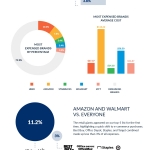Work-from-Home Expenses Dominate the First COVID-19 Impacted Certify SpendSmart™ Report

Analysis of employee expenses highlights spending trends in corporate travel, employee supplies and food purchases during the first half of 2020
LOS ANGELES & PORTLAND, Maine–(BUSINESS WIRE)–Perks such as employer-provided meals saw a huge increase as organizations transitioned to working from home. The latest Certify SpendSmart Report from Emburse, a global leader in expense and AP automation solutions, showed the impact of the pandemic, which saw a tremendous increase in food deliveries and employee purchases for their home office working environments.
Among the featured data in the SpendSmart Report, key findings include:
Food Delivery Services
Food delivery services grew by 110% annually, as DoorDash increased its market share. Uber Eats lost significant ground in both market share and average spend.
- DoorDash continued its leadership position in the sector, accounting for 36% of expenses submitted, compared to 25.1% for Grubhub, 17.1% for Uber Eats and 11.5% for Postmates.
- DoorDash saw a significant growth in its market share, up from 29.5% in 2019, while Grubhub declined slightly from 27.3% and Uber Eats saw a sharp fall from 25.6%.
- However, average spend with Grubhub was significantly higher than DoorDash, at $74.52 compared to $57.51, and $34.96 for Uber Eats.
- Grubhub also grew its average spend by 23% year over year, compared with just 6% for DoorDash. However, Uber Eats average spend shrank by 26% year over year.
Retail
In other signs of a major shift away from business travel to working from home, vendors such as Amazon and Walmart saw a significant increase in their share of business expenses.
- Amazon’s share of receipts more than doubled over the same period in 2019.
- Walmart’s share of receipts grew by 30%, as employees equipped their home offices for remote work.
- The share of receipts for “Supplies” increased over 75% over 2019.
Travel & Hospitality
While business travel almost stopped entirely as a result of the pandemic, some industries were more effective at maintaining pricing amid a drastic business downturn, according to Certify’s data.
- Among the five most expensed airlines (American Airlines, Delta Airlines, United Airlines, Southwest Airlines, and Alaska Airlines), the average airline ticket price fell 5.6% over the same period in 2019.
- Among the five most expensed hotel chains (Marriott, Hampton Inn, Courtyard by Marriott, Holiday Inn Express and Hilton Garden Inn), average spend per transaction increased by 2% over the same period in 2019.
- Among the five most expensed car rental providers (National Car Rental, Enterprise Rent-a-Car, Hertz Car Rental, Budget Car Rental and Avis Car Rental) average spend per transaction grew by 6.4% over the same period in 2019.
Ride-Hailing Services
The two ride-sharing giants continued to erode taxis’ razor thin market share, and Uber remains the category leader by far.
- Uber continues to maintain its dominance in the ride-hailing industry, with a 71.9% market share, compared to 24% for Lyft and just 4.1% for taxis.
- Over the past four years, Uber’s market share has held steady among business travelers, with most of Lyft’s gains coming at the expense of taxis. In H1 2016, Uber had a 72.4% market share, with taxis at 23% and Lyft at just 4.6%.
“The impact of COVID-19 on business travel and the broader economy has been well documented,” said Eric Friedrichsen, CEO of Emburse. “Employees are still submitting a large number of expenses, but with far more of an emphasis on work-from-home purchases, such as office supplies and internet upgrades. A real bright spot that has emerged is organizations’ efforts to humanize work for their teams. By providing benefits such as paid lunches for their employees, and allowing team members to expense equipment like external monitors and office chairs, organizations are helping to boost employee morale, well-being and productivity during what looks like a prolonged period of working from home.”
Friedrichsen added, “While work-from-home purchases kept the volume of expense reports reasonably high, we have also started to see a slow but steady recovery in business travel, which continues to increase the overall volume of expenses submitted through our solutions. The volume of expense reports Emburse processes has increased consistently since its low point in mid-May, and we are now seeing volumes that are less than a third below the same period in 2019.”
About Emburse
Emburse humanizes work by empowering business travelers, finance professionals and CFOs to eliminate manual, time-consuming tasks so they can focus on what matters most.
Emburse brings together some of the world’s most powerful and trusted expense and AP automation solutions, including Abacus, Captio, Certify, Chrome River, Nexonia and Tallie. The company’s innovative offerings, which are uniquely tailored for specific industries, company sizes, and geographies, are trusted by more than 4.5 million users in more than 120 countries.
Over 14,000 customers, from start-ups to global enterprises, including Boot Barn, Grant Thornton, Telefónica, Lufthansa Systems, and Toyota rely on Emburse to make faster, smarter decisions, empower business travelers to recapture lost nights and weekends spent doing tedious expense management, and help make users’ lives – and their businesses – better.
For more information on Emburse, visit emburse.com, call 877-EMBURSE, or follow the organization’s social channels at @emburse.
Contacts
Palmer Roberts, Zeno Group for Emburse
310-906-5809
Palmer.Roberts@zenogroup.com

